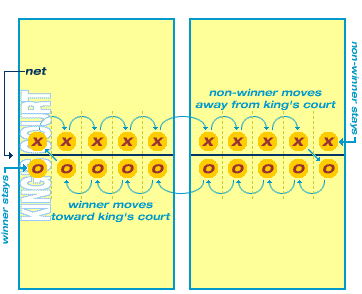|
Volleyball Court Challenge
- Outcome C (10-30)-3
Students play mini games of volleyball in a king's
court format. Teams should be very small to allow for skill practice.

Mini Game #1
- Direct students to work
with a partner to practice setting the ball. By cooperating in
ball placement, see if they can keep a rally going using setting
only.
- After a few minutes, instruct the students
to become opponents and set out on the floor the lines they wish
to use in their mini game. Use a net.
- Students need to consider the ability
of the person they are playing against and set the boundaries
accordingly. For example if "A" played against "B" and "B" was
a more skillful player, they could agree to make the court size
for "B" smaller than the court size for "A". This demonstrates
fair play.
- Allow a maximum of three points per game.
When a player reaches three points, they sit.
- The winning team then moves to the next
court towards the "King's Court" and the team that did not win
moves to the next court away from the "King's Court". (See diagram
above.)
- A new game starts by determining new
boundaries with the new opponent.
Mini Game #2
Students can do the same as above using a forearm pass only.
Mini Game #3
Students can do the same as above using the set or forearm pass
to play the game.
Full Games
Have the students eventually play 6 on 6, but allow them to set
up fair rules before each match, according to the players' abilities.
For instance, they may decide on different boundaries, or allow
someone to serve from closer to the net, or give a player more chances
to serve.

Have students work in pairs or threes.
Insist on two or three hits per side before passing
it over the net.
This method of setting rules for fair play can
be applied to many other games as well.

These
are clues that you have reached the outcomes ...
Students recognize the need for fair play by
accepting this challenge.
Students give positive feedback at the end of
class in discussion about the activity and how it made them feel.
back
to top
|


